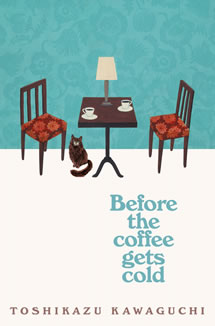Reviewed by Robert Goodman.
By Toshikazu Kawaguchi, Pan Macmillan, $18.99.
 Before the Coffee Gets Cold has a science fictional premise but it is a loose one. A certain chair in a certain underground café in Tokyo (called Funiculi Funicula) is the key to travelling through time. But before anyone gets any ideas of a Back to the Future-style romp, they are introduced to the rules. So many rules. The rules make sense in light of what author Toshikazu Kawaguchi is trying to convey but they take all of the fun out of the premise.
Before the Coffee Gets Cold has a science fictional premise but it is a loose one. A certain chair in a certain underground café in Tokyo (called Funiculi Funicula) is the key to travelling through time. But before anyone gets any ideas of a Back to the Future-style romp, they are introduced to the rules. So many rules. The rules make sense in light of what author Toshikazu Kawaguchi is trying to convey but they take all of the fun out of the premise.
So, the rules: you have to stay in the seat, nothing you do while you are time travelling can affect the present, you can only ever do it once, and you have to return before the cup of coffee you are given goes cold or be damned for eternity. The story itself focusses on staff and regulars at the café and four stories in particular. A woman whose boyfriend has left her for a job in the US who she wants to see again, a woman whose husband has Alzheimer’s, a woman who wants to see her estranged sister again after she is killed in a car accident, and a woman who wants to go into the future to see her as yet unborn baby when they are a child.
Before the Coffee Gets Cold started life as a play and it shows. It is hard to tell if it is the writing or the translation (by Geoffrey Trousselot) but the who thing feels stagey (a movie version came out in Japan in 2018). It does make some sense of the rules, though, which seem to be designed to keep the characters locked in space while engaging with each other.
Time travel as a literary device is not new. And Before the Coffee Gets Cold takes a very Japanese approach to this trope. Time travel here is used as a way of unearthing secrets and being able to say things that were unsaid. None of the four characters who time travel get exactly what they want but all four find a kind of resolution from their encounter, a catharsis and a way forward by re-examining a past event through fresh eyes. The stories themselves are sweet but slight and the outcomes quickly become predictable. But for those looking for something a little different – the story, its setting and the way it is told adds a new note to the range of Japanese fiction available in translation.
This and over 450 more reviews can be found on Pile by the Bed.











